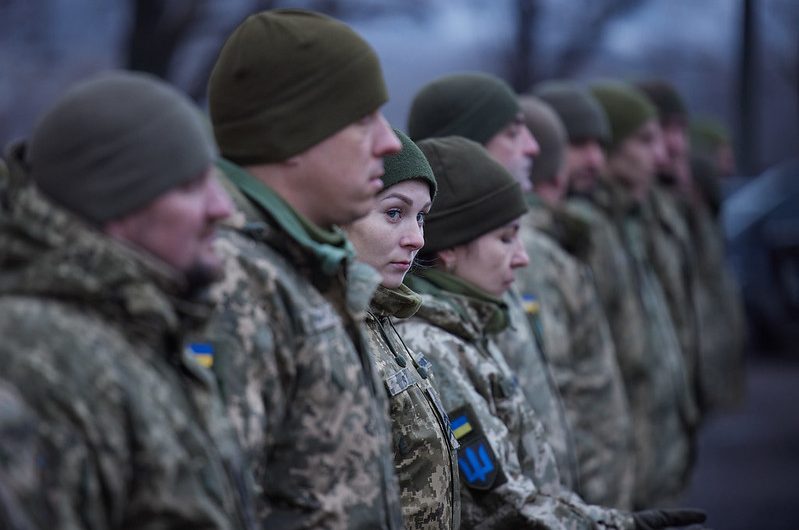
President Of Ukraine via Flickr
Shaping Foreign Policy

R. Delphi Cleaveland
Foreign Policy Expert
R. Delphi Cleaveland is Special Assistant and Advisor to the Acting Ambassador-at-Large in the Secretary's Office of Global Women's Issues at the U.S. Department of State, where she manages special projects including gender integration at the Summit for Democracy. Prior to her role at the State Department, Delphi was a Research Associate at the Council on Foreign Relations and has held positions at the United Nations in Geneva, the Mortara Center at Georgetown, and the BMW Group LLC. in Washington, DC. She was also a German Parliamentary Fellow in 2018 and a Fredrick Conger Wood Research Fellow in 2015. Delphi holds a B.A. from Cornell University and an M.A. from Georgetown University’s School of Foreign Service.
Germany’s “Feminist” Approach to the War on Ukraine
The views expressed in this article are those of the author and not necessarily those of the U.S. Government.
“As long as women are not safe, no one is safe.”[1] The evocative line inaugurates German Foreign Minister Annalena Baerbock’s preface to her Ministry’s recently released “Guidelines on Shaping a Feminist Foreign Policy”—a bold, new framework centered on human security and inclusive, long-term policy planning. With influential strands that weave economics, sociology, and strategic foresight into account, the new guidelines harbor incredible potential to shape not only the immediate efforts in Ukraine but establish precedents for a universal paradigm shift in foreign policy on the European continent.
The Feminist Foreign Policy (FFP) envisioned by Germany is a framework in which the strategic benefits of diverse ideas and perspectives during, amidst, and after conflict are harnessed; in which democratic, pluralistic peace is fought for and upheld; and wherein global societies prosper through a more equitable distribution of resources and power. It builds neatly upon UN Security Council Resolution 1325, to address the disproportionate and unique impacts of conflict on women and girls, as well as identify their strategic value in circumstances of conflict, crisis, and peace processes.
The common misconception, bolstered by many on the far right as well as those on the left, comes from an evocation of the word “feminism” reminiscent of the 1960s and 70s. During what feminist scholars refer to as “second-wave feminism,” more radical approaches to protesting, such as “bra-burning” (a symbolic rejection of the beauty standard) were absorbed by opposition to discredit and trivialize the women’s movement.[2] These misconceptions bleed into the public discourse today and are not helpful in understanding the global strategic framework proposed by Foreign Minister Baerbock’s team. Countries with higher rates of gender equality are more peaceful. They have lower rates of recidivism to conflict, both internally and among neighboring states. Likewise, countries with higher gender equity, in which women and marginalized groups are included in decision-making, paid equitably for their labor, and protected under the law are healthier, more economically prosperous, and harbor better domestic security environments. Reaction to the word “feminist” largely reflects the inherent misogyny these three simple syllables often evoke, but the more salient critiques of the policy framework—that consider the broadness of scope and its applicability in the face of the unremitting conflict in Ukraine—are equally disqualifiable.
Treated skeptically by many, Germany’s new FFP has been doubted regarding its ability to aggressively address the exacerbating conflict between Russia and Ukraine, now entering its second year. But what many policymakers have written off as “incomprehensible” might be just revolutionary enough, and could, in fact, save Germany’s diplomatic street credit, if acted upon wisely.
As the war on Ukraine wages on, Germany stands on the precipice. Every move in this delicate chess match is monitored, by Russia, Europe, and indeed U.S. allies in Washington. Was Feminist Foreign Policy the right move in this bout?
At a time when confidence in the Bundesrepublik is low in Ukraine and across much of Eastern Europe, in light of Germany’s hesitancy to provide military support and the pro-Russian conspiracy theories swirling in parts of the East, an entirely new policy framework is a high-stakes-high-reward undertaking.
The war in Ukraine has prompted Germany to reevaluate its leadership on the continent. Having long been the EU’s economic powerhouse, the country now aspires to be the bloc’s security and defense leader, as well. This is a warily welcome posture vis-à-vis a suspicious Ukraine, where there are all-too-recent memories of energy ventures by Germany to appease Russian oil companies and strengthen reliance by building Nord Stream I and II; and of former Chancellor Angela Merkel winning plaudits for her speech at the Munich Security Conference in 2014, when she refused to adopt military tactics in the face of Russian aggression towards Ukraine and the later annexation of Crimea.
The irony is that exactly where the Minsk Accords fell short are precisely the gaps Germany’s FFP is seeking to fill. FFP is not pacifism—it is much more nuanced than that. FFP is also not misandry; it’s much more inclusive than that. Three shortcomings of the Minsk Accords highlight the potential for Germany to right its wrongs with its new policy framework in the face of dubious Ukrainians.
- The Trilateral Contact Groups, charged with facilitating a diplomatic resolution and early infrastructure of a peace plan in 2014, while containing representatives from Ukraine, the Russian Federation, and the Organization for Security and Co-operation in Europe (OSCE), only included two women—both from Ukraine—on the negotiation teams. This approach undoubtedly omitted critical perspectives otherwise provided by a more diverse negotiation body and did not reflect the pluralism claimed to be of value by Ukraine, as well as France and Germany who served as the mediation leaders. Such a formula undermines civilian buy-in and leaves blind spots in the scope of remediation.
- Another area of omission in the Minsk Accords was a detailed framework for transitional justice. While the FFP does not explicitly cite “transitional justice” by name, its guidelines (Guideline 1.2) calling for perpetrators to be brought to justice and for rigorous monitoring by bodies, such as the UN Human Rights Monitoring Mission in Ukraine, are an expansion of previous efforts for which the German government lobbied. Transitional justice is a critical component of enhancing trust of individuals in state institutions, by providing recognition to victims of war crimes and promoting legally enforced human rights standards. Germany’s ongoing work with the International Criminal Court (ICC) to document cases of conflict-related sexual violence (CRSV) in Ukraine to hold perpetrators accountable is already a huge step towards rebuilding confidence between Germany and Ukraine.
- Finally, under the new FFP guidelines on inclusive humanitarian assistance and crisis management, Germany seeks to systematically include women and marginalized groups in crisis, stabilization, and peacebuilding efforts (Guideline 2.2). This includes a strong reliance on women-led civil society networks, who were entirely left out of the Minsk Accords, despite their inclusion time and time again yielding critical value in humanitarian response and greater security and longer lasting stability, post-conflict. Including individuals such as Ukrainian Human Rights Activist Oksana Horbunova, who was one of the first to discover that Ukrainian women were disappearing at alarming rates and subsequently exposed entire networks of human trafficking actors, or Lyubov Maksymovych, whose NGO sprang into action to provide vital assistance to women and girls affected by the war including psychological and legal aid and help finding jobs amidst the crisis, or Antonina Shostak, a fastidious lawyer documenting the myriad cases of CRSV taking place in the month after the Russian invasion. These are among the women who have courageously led their NGOs to focus on supporting people affected by the war. They are the ones working with local governments and international organizations to provide basic services to refugees and internally displaced people such as organizing accommodation, food, social services, education for children, and psychological services. They make up an integral and often untapped population of actors whose financial support and recognition from an entity such as the German government stands to have prodigious impact.
Germany stands on the precipice. The opportunity to lead Europe through more than economic means looms, but every move is closely monitored and scrutinized. The controversial and choice titling of Germany’s new foreign policy may have alienated some, but acting swiftly on its contents could push the country to new heights of leadership and rectify various faux pas to strengthen German-Ukraine relations and bolster the latter as it continues to defend itself against Russian aggression.
Lasting peace will remain elusive for any society that fails to bring 50 percent of its population into the fold before, during, and after conflict. On this International Women’s Day, it is high time Germany move the needle; to sing the gospel of unity in the face of war, of smart policymaking that establishes strong and inclusive negotiations, strategically tackles vulnerability to prevent blind spots, lends resources to as many marginalized groups as possible, and think in terms of the long game, rather than assuming a reactive posture to crises. The strongest foreign policy is not prescriptive, but strategic; not naïve, but adaptive and multifaceted. It is foreign policy centered on diplomacy that speaks and functions for all people.
[1] Quote taken from a Ukrainian woman in conversation with German Foreign Minister Baerbock near the contact line between Russian and Ukrainian forces, in early 2022. Cited in Shaping Feminist Foreign Policy: Federal Foreign Office Guidelines, published 2023 by the Federal Foreign Office.
[2] Jennifer Lee wrote about this in her 2014, Times Magazine piece “Feminism Has a Bra Burning Myth Problem” when she stated in reference to the Miss America Pageant Protest in 1968: “There is no statue on the Atlantic City Boardwalk to commemorate an important protest about standards of beauty for women and a contest tied into capitalism, war, and race. Instead, our cultural touchstone from that day is the negative and trite association of feminists as ‘bra-burners.’”
 This article is part of the Society, Culture & Politics Program’s AGI 40th anniversary series.
This article is part of the Society, Culture & Politics Program’s AGI 40th anniversary series.









